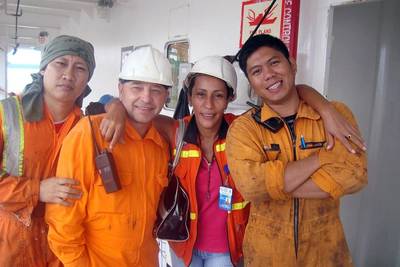250,000 Seafarers Have Pay Boosted by 6%
Seafarers’ unions and maritime employers have signed a four-year agreement that will see significant wage increases and dozens of workplace protections and improvements for over 250,000 seafarers’ serving on more than 10,000 vessels.
The International Bargaining Forum (IBF), the forum that negotiates the world’s largest global collective bargaining agreement, agreed terms for the 2024-2027 IBF Framework Agreement last week in Berlin.
Seafarers covered by the agreement will receive a 6% wage increase over the next two years (4% wage and compensations increase from January 1, 2024 and 2% wage and compensations increase from January 1, 2025). The 2026-27 pay deal and cost items will be negotiated in 2025.
In addition, the agreement includes reference to ILO Convention 190 on Violence and Harassment to reinforce a joint commitment to provide safe workplaces free of violence, discrimination and harassment for all seafarers. There was also a joint recognition of the importance of safe working practices in cargo lashing in the common fight against malpractice.
A new working group was established that will focus on the future of seafaring and major challenges that the industry faces including the impact of new technology, the introduction of alternative fuels, and ensuring a just transition as the industry responds to climate change. Concerns around seafarers’ hours of work, crewing levels, fatigue and duration of employment will also fall under the remit of the working group.
Under the agreement, the Joint Negotiating Group of maritime employers (JNG) committed to remind their members of the importance of respecting national cabotage provisions and committed to working together with the ITF on a strategy to work towards more and more seafarers receiving a reasonable amount of internet access free of charge.
ITF spokesperson and ITF Seafarers’ Section Chair David Heindel said: “This has been a particularly complicated set of negotiations coming out of the Covid pandemic, which has taken a great deal of effort and compromise on both sides to get this right for the times. This is a fair deal. We have agreed a working group that will look at the future needs of a changing industry with an eye on the needs of seafarers, with a focus on recruiting.”
ITF General Secretary Stephen Cotton said: “Over the four years of this agreement, we have a lot of important issues to discuss so that we can continue to enhance the living and working conditions of all seafarers on IBF covered vessels. The biggest challenges we all face is the just transition and the move to alternative fuels. How the industry recruits and motivates our seafarers and ensures they have the skills for the future, this is firmly on our forward-looking agenda.”
Spokesperson for the JNG and Chairman of IMEC Captain Belal Ahmed said: “Once again the resilient partnership between JNG and ITF produced an outstanding outcome in the latest IBF round which both sides and their constituents will be happy to bring to their respective members, seafarers were rewarded for the sacrifices they made during the Covid pandemic when they stood out as key workers. Post Covid joint initiatives by JNG and ITF to face together the new and unprecedented challenges for our industry will now take centre stage. I believe this partnership is key to address the issues affecting seafarers’ welfare and training today towards the ultimate aim of decarbonising and achieving net zero shipping by 2050 whilst resolving seafarers’ shortages.”















